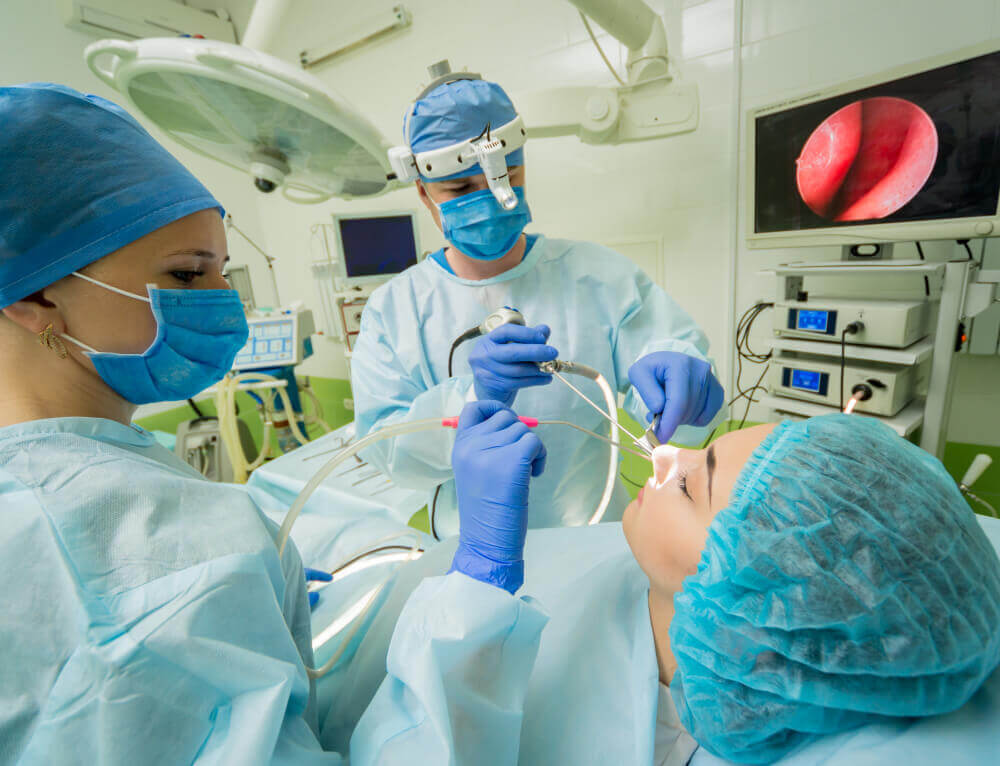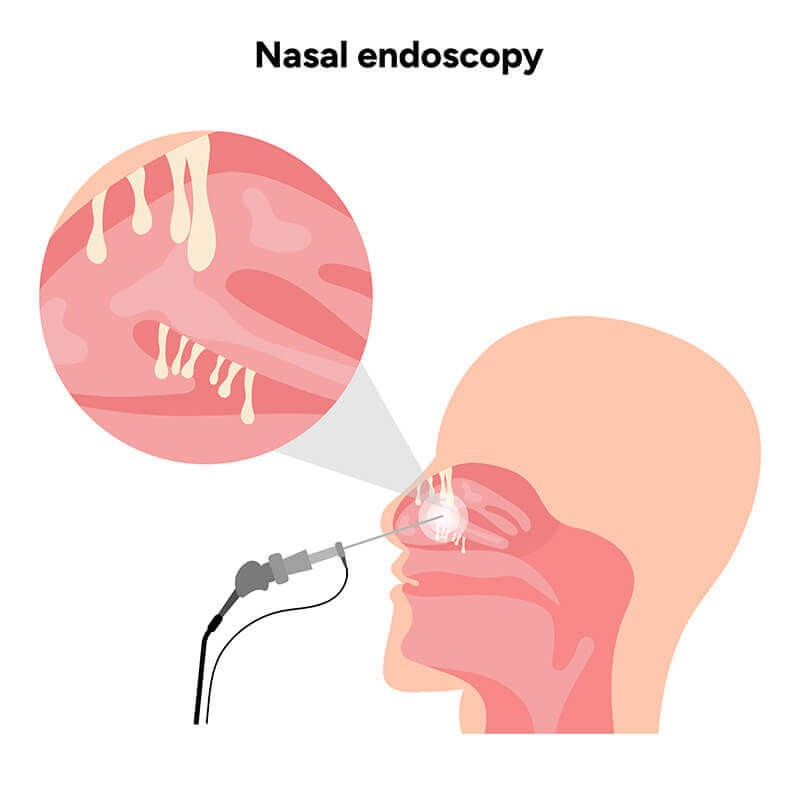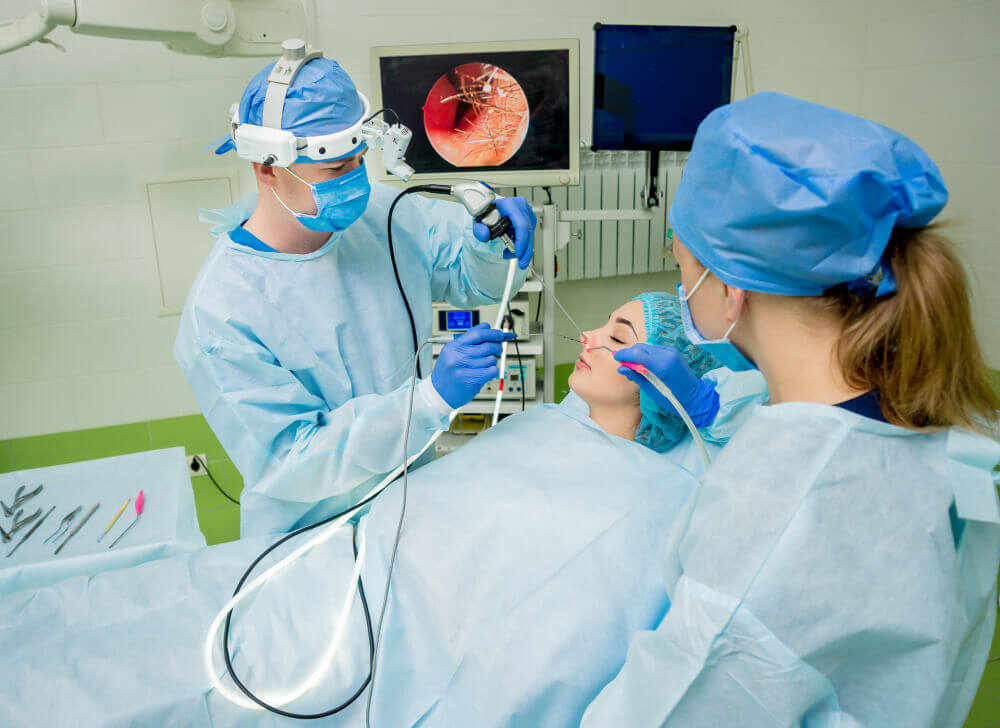Endoscopic Sinus Surgery Seattle
When chronic and recurrent sinus problems interfere with daily life, seeking an Ear, Nose, and Throat specialist may be necessary. Additionally, sinus symptoms that do not respond to traditional, non-surgical methods of treatment and management may necessitate consideration for sinus surgery. ENT surgeons use many different methods to perform sinus surgery, the most common is endoscopic sinus surgery. Dr. David Santos at Sinusitis In Seattle is among one of Seattle’s leading sinus surgeons. Dr. Santos provides the best endoscopic sinus surgery Seattle offers.
UNDERSTANDING ENDOSCOPIC SINUS SURGERY
Endoscopic sinus surgery removes blockages in the sinus cavities and aids in restoring natural function. When chronic or recurrent sinus infections occur, the openings and drainage pathways of the sinuses may become inflamed, irritated, and swollen. This restricts the mucus produced in the sinuses and can lead to clogged, congested sinuses. Chronic sinusitis is perhaps the most frequent culprit of these issues, however, many other conditions may contribute.
A sinus surgery–endoscopic or otherwise–aims to widen the sinuses by eliminating sinus and nasal obstructions. Thus, once Dr. Santos gets rid of the blockages and infected tissue, normal sinus function can return.
What It Treats
As mentioned, chronic sinusitis is the most common cause for the need for endoscopic sinus surgery in Seattle. Other chronic issues such as allergies and nasal polyps can contribute to the need for sinus surgery.
Endoscopic sinus surgery can treat and often alleviate the symptoms of these conditions. If an infection is present, endoscopic sinus surgery can remove it. Among the conditions that may warrant endoscopic sinus surgery include:
- Chronic sinusitis (less commonly subacute sinusitis)
- Fungal sinusitis
- Nasal polyps
- Chronic rhinosinusitis
- Deviated septum (usually in conjunction with a septoplasty)
- Sinus headaches
- Severe allergies
Sinus surgery usually reduces the frequency and severity of symptoms. It may also completely alleviate symptoms. Dr. Santos will discuss if endoscopic sinus surgery in Seattle is the right treatment for you. He will also explain what you can expect from the results of the procedure.
History Of Endoscopic Sinus Surgery
Surgical and manual draining of the sinuses likely goes back centuries. Early forms of sinus surgery required external incisions. The method of using an endoscope to guide and perform surgery through the nostrils was not developed until the 20th century.
Throughout the 1900s, surgeons refined the techniques and instruments used for endoscopic sinus surgery. It began with a modified cystoscope built to observe the nasal cavities and sinuses. Eventually, this developed into surgical procedures using this tool.
As technology advanced, endoscopes were fitted with cameras, lights, and became thinner. This allowed surgeons to be more precise and limited trauma to the nostrils and sinuses. In the late 1980s and 1990s, endoscopic surgery became more widely known and performed. Slowly, it became the highest standard of sinus surgery.
Benefits
Patients who undergo Seattle endoscopic sinus surgery often find many benefits following surgery and recovery. Along with reduced or cessation of symptoms, patients may also experience benefits like:
- Easier breathing
- Reduces or alleviates bad breath
- Treats dry mouth
- Wider sinus cavities
- Improves sleep quality
- Removal of nasal polyps
- Can combine with a septoplasty to correct a deviated septum
- No external scarring
- Limited scarring
- Long lasting results
- No changes in facial appearance
- Minimally invasive surgery
BEFORE AND AFTER ENDOSCOPIC SINUS SURGERY

Consultation
Endoscopic sinus surgery is likely the last resort in treating chronic sinus problems. It is not something taken lightly. Therefore, before surgery, Dr. Santos will want to meet with you for a consultation. At this appointment, he will want to know about your sinus problems, any diagnoses you may have received, treatments you have tried, previous surgeries, and other medical conditions.
Following this discussion, Dr. Santos may perform a physical exam. This can also include a nasal or sinus endoscopy. During this procedure, a camera is inserted into the nostrils to examine the sinuses and nasal passages more closely. This provides Dr. Santos with a close-up look at your sinuses. In turn, this allows him to determine if you are a good candidate for surgery. In some cases, Dr. Santos may also want a CT scan or MRI.
If Dr. Santos believes Seattle sinus surgery will benefit you, he will discuss the surgery and give you instructions on how to prepare.
Endosopic Sinus Surgery
Your Seattle sinus surgery will take place at Sinusitis In Seattle’s state-of-the-art outpatient surgery center. On surgery day, the Sinusitis In Seattle team will prepare you for surgery and place you under general or local anesthesia. Once properly anesthetized, Dr. Santos will begin surgery.
Inserting a thin tube that contains an endoscope and tiny surgical instrument, Dr. Santos will gain visibility of the sinuses. Using the endoscope, he will identify inflamed and infected areas. With the attached surgical tool, Dr. Santos will remove the necessary tissue, bone, or growths necessary. This widens the sinuses and treats symptoms. He will also address any nasal polyps or scar tissue he may come across.
Generally, endoscopic sinus surgery takes less than an hour. Although, more extensive or combined procedures may take longer. It involves no external incisions and Dr. Santos performs the surgery solely through the nostrils. As an outpatient procedure, patients go home the same day.
Recovery
Compared to other types of surgery, the recovery for sinus surgery is fairly minimal. Dr. Santos usually recommends taking around a week off work to promote proper healing. Though, he may clear you for work sooner. During the first five or so days after surgery, it is normal to experience sinus pressure and bleeding. You may also experience some minor pain and discomfort.
Dr. Santos will prescribe pain medications and possibly medicated rinses or sprays. These will manage pain, symptoms, and keep the sinuses and nasal passages clean. It is not uncommon to experience congestion or swelling following the procedure. Therefore, easier breathing and other benefits will not immediately appear.
Instructions Dr. Santos may give for your recovery may include:
- Limit activity for a week
- Avoid strenuous exercise for two weeks, possibly more
- Perform nasal irrigation as directed by Dr. Santos
- Sleep with your head elevated
- Report any concerning symptoms to Dr. Santos right away
- Do not blow your nose
- Attend postoperative appointments
- Do not return to work or other activities until cleared by Dr. Santos

FREQUENTLY ASKED QUESTIONS
Does Endoscopic Sinus Surgery Work?
Today, endoscopic sinus surgery is one of the most effective treatments for sinusitis symptoms that do not respond to traditional therapies. Modern endoscopic sinus surgery techniques are 85-90% effective in eradicating or reducing sinus symptoms. While not every patient will see a complete cessation in symptoms, any residual symptoms will likely respond well to management techniques. Overall, sinus surgery improves the quality of life.
Is It Necessary?
Seattle endoscopic sinus surgery is considered a last resort for patients experiencing sinus symptoms. It is uncommon for sinusitis not classified as chronic sinusitis to be treated with sinus surgery. The point sinus surgery becomes necessary varies for everyone, however, sinus symptoms will usually begin to interfere with everyday life.
Additionally, certain forms of sinusitis require surgery to treat. If an infection spreads beyond the sinuses or is an aggressive fungal infection, this usually requires immediate surgical treatment. These cases are rare and Dr. Santos most commonly performs endoscopic sinus surgery on chronic sinusitis sufferers.
What Are The Risks Of Sinus Surgery?
Like any surgical procedure, sinus surgery does come with some risks. The most pertinent risks include infection, bleeding, and risks associated with anesthesia. While risks of injury to surrounding structures is possible, this is exceedingly rare. This is especially true when choosing an experienced sinus surgeon like Dr. Santos.
Dr. Santos takes every precaution to reduce the risk of surgery. This includes patient screening, choosing the right anesthesia option, and minimally invasive surgical methods. Dr. Santos can discuss any additional individual risks you may have during a consultation.
Can Dr. Santos Perform Other Procedures At The Same Time?
Yes, if you need another procedure that may improve breathing or results, Dr. Santos may be able to combine the procedures. An example of this is if you have a deviated septum, Dr. Santos may perform a septoplasty at the same time. This is best discussed after a physical exam and consultation.
Will My Face Look Different?
Sinus surgery rarely causes changes in appearance. Regardless, if you are concerned, Dr. Santos is also a board certified facial plastic surgeon. He understands facial anatomy from a cosmetic standpoint and how to create a good result. Therefore, Dr. Santos is qualified in both sinus surgery and plastic surgery. This may alleviate worries about facial changes after sinus surgery.
THE BEST ENDOSCOPIC SINUS SURGERY IN SEATTLE WITH DR. DAVID SANTOS
Endoscopic sinus surgery requires a precise and delicate handed surgeon. Dr. David Santos is a board certified otolaryngologist with thirty years of experience in sinus surgery. Throughout his career, Dr. Santos has performed or supervised thousands of surgeries including sinus surgeries and facial plastic surgeries. This makes him one of Seattle’s foremost experts in facial anatomy and sinus surgery.
Dr. Santos also served as Chief of Staff for the Department of Otolaryngology at Valley Hospital for eight years. His expertise and experience mean that Dr. Santos performs the best endoscopic sinus surgery Seattle offers.
Sinusitis In Seattle is located just south of Seattle. To learn more about endoscopic sinus surgery and schedule a consultation, call us at 206-242-3696. You can also contact us via our online contact form.
Contact Us

